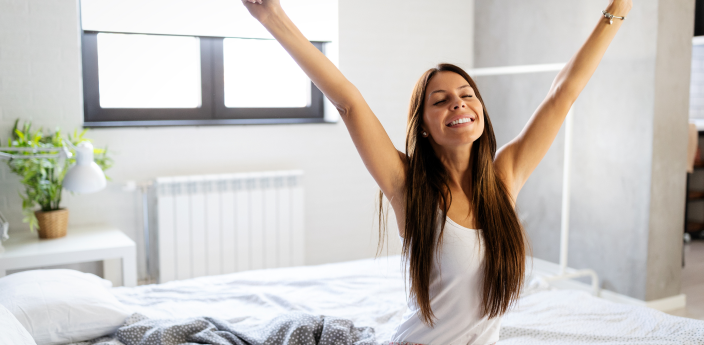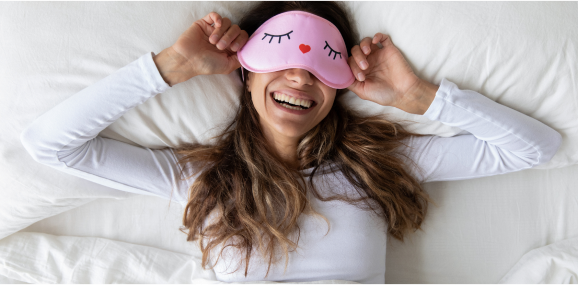Sleeplessness is maddening. Even short term, missing out on much-needed sleep can cause negative effects. Not getting enough sleep is linked to health problems like high blood pressure and heart disease.
The side effects of sleeplessness are challenging, but what’s even more challenging is trying to discover why you aren’t sleeping in the first place.
At Hug Sleep, we understand sleep problems. Together, we’ll talk about the factors that could be affecting your sleep quality and give you ways to help promote better rest.
We’ll also talk about a scientific therapy that helps stimulate your parasympathetic nervous system so you can relax before you settle in for rest.
Ten Reasons Why You Can’t Sleep
You’ve tried sleeping pills, setting your alarm a little later in the morning, and going to bed earlier. No matter what, you still can’t seem to settle into a solid sleep schedule. Here are ten reasons that might be causing your lack of sleep.
1. Sleep Disorders
First, it’s important to address the subject of sleep disorders. While sleep issues are common, sleep disorders are medical conditions that require a diagnosis. Sleep apnea, restless leg syndrome, and chronic insomnia (sleeplessness that lasts for longer than a month) should be diagnosed and addressed by a sleep specialist.
2. Sleep Habits
The way we go to sleep and the environment we create for ourselves play a role in whether or not we get good sleep on a consistent basis. Also referred to as “sleep hygiene,” the habits we create — like staying up late, having too much light in our rooms, or not sleeping on comfortable bedding — all play a role in our ability to sleep well.
3. Alcohol
Having a nightcap might be just the thing to relax your body and ease your mind — but if you drink more than one, you could experience problems sleeping. Studies show that more than one drink before bed can inhibit your ability to experience REM sleep, a necessary part of your sleep cycle that helps your brain store away information from the day.
4. Sharing Your Bed
Whether your sleep mates are human or animal, a partner in your bed can make it hard to sleep. If your partner snores or moves around too much, it can disturb your own ability to sleep. Furry friends can increase the temperature under the covers, making it too hot to get good rest.
Sharing a bed with a pet or child will almost certainly result in fragmented sleep. Fragmented sleep, also called interrupted sleep, is characterized by periods of sleep with numerous disturbances in between that wake you up.
This might not seem too troubling, especially if you’re able to fall right back asleep once you’ve been woken up. However, waking up during the night disturbs your sleep cycles and wake cycles, which are crucial for restoring and repairing practically every system in your body.
5. Temperature
According to sleep experts, the perfect sleep temperature is between 60-70 degrees Fahrenheit. If this sends shivers down your spine, consider this: your core body temperature naturally lowers by one to two degrees at night to prepare you for sleep. Your body instinctively knows that lower temperatures allow you to get better sleep.
If your room is warm, consider turning on a fan to help with airflow or lowering the air conditioner just a degree to help cool off.
6. Caffeine
Most of us rely on coffee or tea to kick start our mornings, but if you’re relying too heavily on stimulants, they could be interfering with your ability to sleep. Caffeine has about a five-hour half-life, which means that five hours after you consume a caffeinated beverage, half the amount of caffeine is still in your system.
If you drink a cup of coffee at 4 p.m. that contains 95 milligrams of caffeine (the average in a decent cup of joe), by 9 p.m. there will still be close to 50 milligrams left in your system, making it hard for you to unwind, relax, and get the sleep you need.
It’s a circular problem, too. When you don’t get enough sleep at night, you rely more heavily on stimulants like coffee to power you through the next day. Too much caffeine intake is a very common cause of not being able to sleep, and one that is easily fixable by limiting the number of caffeinated drinks you have, and how late in the day you have them.
7. Exercise
Exercise is crucial to your ability to sleep. On the one hand, if you aren’t physically active enough, your sleep drive (the internal tank that fills as you expend energy) won’t be strong enough to signal your body that sleep is needed.
On the other hand, working out too late in the evening can stimulate your entire nervous system and make it impossible to get the rest you need. Exercising an hour before you plan to sleep is too close to ensure your body can fully unwind. Instead, plan your workouts in the early evening at the latest so your body has time to readjust before bed.
8. Midnight Snacks
Eating late in the evening can cause your digestive system to put in work while you’re trying to rest. Spicy foods can promote heartburn, and food that is high in fat can take your body longer to digest, meaning that your body is working hard to metabolize your calories while you are trying to sleep.
Work or school schedules may make it difficult to eat dinner right at 5 p.m., but avoiding food within an hour of bedtime can help you overcome trouble sleeping brought on by digestive issues.
9. Screen Time
Scrolling through your feed, checking your email, watching TV, or even reading an e-book may all seem like great ways to relax before bed. Unfortunately, the blue light emitted from these devices interferes with your circadian rhythm, a.k.a. your internal clock.
Your circadian rhythm uses daylight to tell your body when to be awake and when to be asleep. As the bright light of the day fades, the circadian rhythm kicks off the release of melatonin to help you relax and prepare for sleep.
That process is interrupted by staring at bright screens on electronic devices that emit blue light (also emitted by the sun). This blue light can fool your body clock into thinking it’s time to be awake instead of time to be asleep.
10. Stress
Everyone experiences stress, and not all stress is negative. Stress helps us finish deadlines, respond quickly in emergency situations, and make important decisions. However, long-term stress can begin to interfere with your sleep.
Feelings of stress, worry, and nervousness are counterproductive to falling asleep. These feelings can make it hard for you to relax enough for sleep, and they may even interfere with your mental health. If you experience poor sleep for a few days in a row, you may also develop negative thoughts about sleep, which can make it even harder for you to rest.
Many people find it difficult to unwind, relax, and quiet their minds before sleeping. The real problem is your amazing (but sometimes problematic) central nervous system.
The Central Nervous System and Your Sleep
Your nervous system controls many activities in your body, including the regulation of your wake and sleep times. There are two components of your nervous system that are involved in these processes: the sympathetic nervous system, or “SNS,” and the parasympathetic nervous system, or “PSNS.”
The Sympathetic Nervous System
During the day, your sympathetic nervous system keeps you focused, awake, and alert. Your SNS is responsible for stimulating your “fight or flight” response, helping you react quickly and efficiently when needed. The SNS can elevate your heart rate and your blood pressure, depending on the situation.
The SNS is important, but it’s also the source of your feelings of stress, worry, and nervousness. The SNS triggers the release of the hormone cortisol, which can keep your body in a constant state of high alert.
The Parasympathetic Nervous System
The parasympathetic nervous system helps your body relax. Mostly at work during the evenings, your PSNS triggers the release of soothing hormones like dopamine and serotonin. A lower heart rate, relaxed muscles, and a sense of calm are all products of the PSNS.
Ideally, the SNS slows down in the late afternoon, making way for the PSNS to take over and prepare your body for sleep. Unfortunately, the system doesn’t always work perfectly. Your SNS can stay engaged, leaving you feeling wired when you need to sleep.
Thankfully, there’s a way to hack the system.
Deep Touch Pressure Therapy
The science of deep touch pressure therapy, also known as deep touch pressure stimulation, uses gentle pressure to stimulate sensory receptors in the skin. These receptors send the message to your brain to engage the PSNS, helping you to relax and prepare for rest.
This deep touch pressure stimulation helps your PSNS transition to a state of relaxation so you can get a good night’s sleep. The best part? It’s easily accomplished with the help of a specialized, wearable blanket.
The Hug Sleep Sleep Pod Experience
At Hug Sleep, we were tired of daytime sleepiness, nighttime angst, and relaxation techniques that never seemed to work. When our founders discovered DTPT, they finally found hope for conquering sleepless nights.
Based on the science of deep touch pressure stimulation, the Hug Sleep Sleep Pod provides gentle, all-over pressure in the form of an ultra-breathable, wearable blanket. Made with four-way stretch fabric, the Sleep Pod delivers a sensory experience most people find incredibly comfortable.
By cocooning yourself in the Sleep Pod, you’ll enjoy complete mobility (even for your feet) and supreme comfort. It works whether you prefer the cool temperature of wearing the Sleep Pod by itself, or the warmth of snuggling it under an additional blanket.
Finding New Ways To Relax
Good sleep is essential to your overall wellness. Consistent lack of sleep can result in negative health conditions that can make it hard to function during the day. Fortunately, making small lifestyle adjustments can help you get better sleep and enjoy brighter, more energetic days.
If you find it hard to relax and wind down before bed, snuggle into a Sleep Pod, the only wearable blanket that hugs you back. Wrapping yourself in the comfort of a Sleep Pod is an easy adjustment to your sleeping environment that can help you relax and finally feel great about heading to bed.
Sources:
How Does Sleep Affect Your Heart Health? | cdc.gov
The Role of Sleep Hygiene in Promoting Public Health: A Review of Empirical Evidence | NCBI
Alcohol and the Sleeping Brain | ScienceDirect
Interrupted Sleep - Causes & Helpful Tips | Sleep Foundation
The Best Temperature for Sleep: Advice & Tips | Sleep Foundation

































500,000+ happy customers